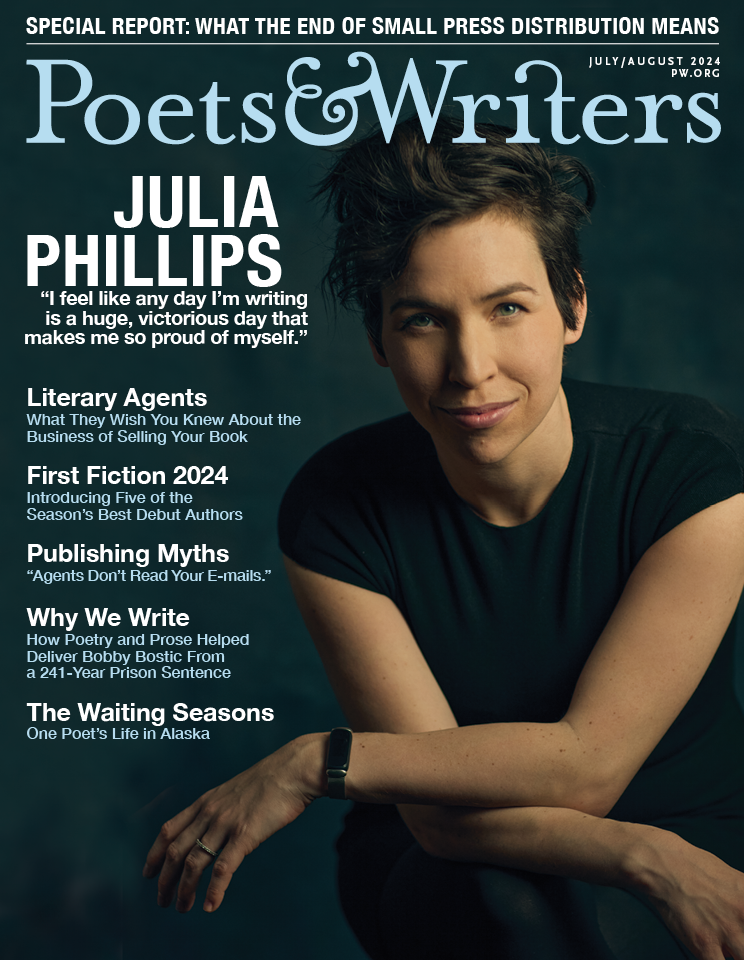Poets & Writers Magazine welcomes feedback from its readers. Please post a comment on select articles at pw.org, e-mail editor@pw.org, or write to Editor, Poets & Writers Magazine, 90 Broad Street, Suite 2100, New York, NY 10004. Letters accepted for publication may be edited for clarity and length.
Letters
Feedback from readers
Just a note to affirm and thank Bobby Bostic for his timely, informative, and compelling essay “Why We Write: How Poetry and Prose Helped Deliver Me From a 241-Year Prison Sentence” (July/August 2024). There is a significant amount of research in the field of poetry therapy that speaks to “the healing power of words.” With respect to poetry in prisons, I highly recommend reading the work of Jimmy Santiago Baca, a celebrated poet who started writing while serving a prison sentence.
Nicholas Mazza
Tallahassee, Florida
Many of us live in self-imposed prisons and have excuses for why we can’t write, exercise, volunteer, fill-in-the-blank. If Bobby Bostic’s “Why We Write” doesn’t inspire you to persevere and create something you love, please read it again. And again and again.
Sandy Pence Kangas
Menominee, Michigan
I am responding to Philip Metres’s article “In This Time of War: The Muses Refuse Silence” (May/June 2024). I am a published poet and writer. I am Jewish (nonpracticing) and a longtime subscriber of Poets & Writers Magazine. I feel that this article should not have been published in your magazine because it is too political. I thought I was reading the written form of a CNN broadcast, another summary of the Israel-Hamas war in Gaza. The article should have been about how the power of language in the form of poetry could be and should be applied by both Israeli and Palestinian poets to tackle the hostage crisis and war in Gaza. In other words, how is poetry used by poets of both sides to illustrate the atrocities of terrorism and war, and, most important, how is poetry utilized to create peace and understanding on both sides? How does poetry bring conflicting people together? How is poetry used to create fresh solutions to these conflicts between the Israelis and Palestinians? There were only three examples of Palestinian or Palestinian American poets using poetry to illustrate my above questions. He named only one Jewish poet; Jewish poetry wasn’t quoted at all. The only good aspect of Metres’s article is that it made me mad enough to write this response and e-mail it.
Joliene Dexter
Yucca Valley, California
I found the essay “In This Time of War” to be deeply thoughtful and meaningful. I was glad to see it published in Poets & Writers Magazine. I’ve gone back to this essay more than once and have been moved to tears each time.
Nicki Youngsma
Portland, Oregon
Traffic
Five of the most popular posts from pw.org
1. “First Fiction 2024” (July/August 2024)
2. “Literary Magazines That Pay” (November/December 2022) by Aaron Gilbreath
3. “Twenty-Two of the Most Inspiring Writers Retreats in the Country” (March/April 2019)
4. “The End of Small Press Distribution” (July/August 2024) by Michael Bourne
5. “The Heart-Work: Writing About Trauma as a Subversive Act” (January/February 2017) by Melissa Febos







